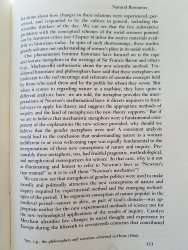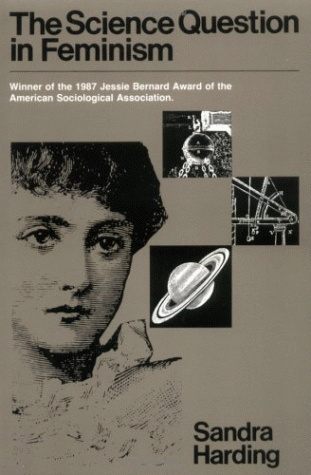From the “Did he/she really say that?” file. Here is adversarial-feminist philosopher Sandra Harding on Isaac Newton’s Principia Mathematica:
“why is it not as illuminating and honest to refer to Newton’s laws as ‘Newton’s rape manual’ as it is to call them ‘Newton’s mechanics’?”[1]
How did she get there? Well, Francis Bacon did say that “Knowledge is Power,” and one could assume that power is always non-consensual and zero-sum. But that’s a stretch. So Harding takes some of Bacon’s metaphors — some of them sexual, some of them not — and uses the character-assassination strategy of free-association interpretation. That is, one brainstorms any spontaneous idea the metaphor suggests to you and then uses the worst one against your target. And since Newton worked in a broadly Baconian framework, his work too is guilty by association.
For a detailed discussion of Harding’s argument, here is Alan Soble’s essay defending Bacon and by extension Newton from these silly charges.
The charges are silly intellectually but they are not silly socially, as the tactics behind the charges have become widespread in academic debates.
Source:
[1] Sandra Harding, The Science Question in Feminism (Cornell University Press, 1987), p. 113. Here’s an image of the page:


You’re totally decontextualizing and misinterpreting Sandra Harding’s one-sentence throwaway claim in order to do the kind of character assassination you accuse her of. This is pretty sloppy.
When you make a claim like that, Dan, you have an obligation to provide the context and explain why.
In this case, please note that the post contains an image of the entire page in which Harding’s line appears. So anyone can read for themselves and see that the sentence is properly interpreted.
Stephen, would you suggest that there is an epistemic conflict of sorts, between “a science”, say biology, or evolutionary psychology and, a “feminist science” like “feminist biology” or “feminist evolutionary psychology”? Say if there were a new journal of “feminist evolutionary psychology” should I integrate that resource into research practice without batting an empirical eyelid? I’m concerned, where other researchers are not – I see no benefit, but much bias or possible confusion from adding the “feminist” or “communist” or “humanist” shell to an otherwise effective process. I hope my question is clear? Kind regards,
Hi Henry: In politicized fields, there’s always grounds for suspicion when an “-ist” adjective appears in front of an already useful concept. But I think one has to proceed case-by-case, and determine what content the adjective is adding, and whether that content is legitimate or not. Best, Stephen
Don’t obscure and mangle our great Newton with feminist nonsense.
Please, let Newton alone. He is above and beyond your silly word games, so just leave him. He can defend himself.
The first sign that people talking about Newton have not read him or understood: prattling about isms.
Your belief in fate is decided in the womb: Testosterone exposure as a developing baby affects whether you’re superstitious
A study by Psychologists at Swansea University’s College of Human and Health Scientists has found that people’s personal ‘locus of control’ – the extent to which people believe we can control events that affect our lives – is partly influenced by the amount of the ‘male’ hormone testosterone that we are exposed to in the womb.
http://www.swansea.ac.uk/humanandhealthsciences/news-and-events/latest-research/yourbeliefinfateisdecidedinthewombtestosteroneexposureasadevelopingbabyaffectswhetheryouresuperstitious.php
She must not have read many rape manuals. They’re nothing like Newton’s laws.
Newton’s books should be read more. They’re not easy reading, but can be interesting.
Mark T. Prange
Her statement is sophistry and nonsense, saying that we must assume such a literary subtext automatically applies to physics writings, too, JUST BECAUSE. Real science and observable laws of physics have no cultural context under which they operate (like literature absolutely has). It’s like saying everyone on the planet was a Nazi in 1940 because Hitler existed.
I just don’t understand these words by Sandra Harding…
It is one thing to assert that women have been discriminated against (e.g. eminent mathematician Emmy Noether was Not given teaching position in Germany) , and quite another thing to call NEWTON’S MASTERPIECE “rape manual”
Practical common sense IS VALUABLE- The correct academic fields for Feminist analysis/theorizing would probably be Society culture, & Political ideologies, NOT PHYSICS THEORIES.
Let us remember that NEWTON’S PRINCIPIA MATHEMATICA IS ONE OF THE MASTERPIECES OF PHYSICAL THEORIES, AT PAR WITH EINSTEIN’S THEORIES OF RELATIVITY. Advanced Mathematics is required to understand Principia Mathematica, and that may Not be a part of Philosophy training. Let us not do injustice to either Feminist Analysis, or to Physical theory. Fallacious reasoning should not be allowed to dominate over rigorous analytical methods. This kind of sophistry may lead to some fashionable post-modernist calling DIRAC’s Quantum Mechanics “murder manual”!!
Thanks, Sumantran Ray
For another example of politics-meets-science, look up Deutsche Physik (“German Physics”), before and including WWII. It denies Relativity and works in an aether framework. (They also believed that we are living on the inner shell of a sphere, so they wasted money on telescopes that peered up at a 45 degree angle, looking for the English fleet.)
Things got so mad in Nazi Germany that there was even a “German” version *Mathematics*.
(And of course, more recently, there’s the cases of Creationism and anti-vaxxer philosophy …)
Lest you understand that “feminazism” (the correct term for the lie of “feminism”) and “bullshit” are synonyms you have no place calling yourself a “scientist”
The history of science will not find a place for feminazism or anything related.
Everything related to feminazism will be relegated to a place under the label of “witch craft” and “feminine delusions”
On a related matter both leftoxenomorphs and feminazis, all cultural marxists, share an external locus of control and that is why most leftists are either feminazis or manginas.
I’m waiting for the first mangina that will request elective cosmetic surgery to flip hur mouth 90 degrees so as to sport a simile vagina on hur face.
Thank you for the interesting quote, Professor. I wonder (and although I have not yet read the Principia Mathematica directly) – Newton wrote at a time where nature was considered something that needed to be tamed; a sort of wild beast that threatened the manicured gardens of high society and instilled fear in the hearts of even the wildest adventurers because it was foreign and unknown. Only over 100 years later did Humboldt return from South America with a new vision for nature as a web of life.
What it seems like to me is that Harding is making a similar point to that which Carol Cohn makes in her discussion of sexualized language of weapons of mass destruction. When we find it difficult to grasp the full consequence of something (whether it be untamed nature or WOMDs), we create metaphors, terms of familiarity to hide behind. A sort of disassociation to protect the self from daunting potentialities.
Perhaps a better question is whether nature is something to be controlled/taken advantage of (regardless of the mechanistic or sexualized metaphors that obfuscate such daunting questions, and which Harding perhaps devotes too much attention to… although I did only read that one page you attached)
@George_Banner
Yikes. That’s lot of very personal baggage you’re dropping on us all.
I wince every time I read that.
I have a degree in math and an interest in physics, especially Quantum Physics. I am doing this just out of interest. a Masters in Philosophy, where I will concentrate on the Philosophy of Science, again, especially QM. Already I have done an online course on QM by the philosopher Tim Mauldin (he gets it wrong – but hey, many people do – I don’t hold it against him – it is a notoriously tricky area). I would eventually like to understand what would lead Harding to make such a nutty statement because it’s barking mad to me.
As an aside, and making this comment longer than it should be, here is my take on QM. Suppose two systems interact, and the result is several possible outcomes. We imagine that, at least conceptually, these outcomes can be displayed as a number on a digital readout. Such is an observation in QM. All I need to know is the number. But I will be more general than this and allow different outcomes to have the same number. To model this, we write the number from the digital readout of the ith outcome in position i of a vector. We arrange all the possible outcomes as a square matrix with the numbers on the diagonal. Those who know some linear algebra recognise this as a linear operator in diagonal matrix form. To be as general as possible, this is logically equivalent to a hermitian matrix in an assumed complex vector space where the eigenvalues are the possible outcomes. Why complex? That is a profound mystery of QM – it needs a complex vector space. Those who have calculated eigenvalues and eigenvectors of operators know they often have complex eigenvectors – so from an applied math viewpoint, it is only natural. But just because something is natural mathematically does not mean nature must oblige. So, we have the first Axiom of Quantum Mechanics:
To every observation, there exists a hermitian operator from a complex vector space such that its eigenvalues are the possible outcomes of the observation. This is called the Observable of the observation.
Nothing is mystical or strange about it, just a common sense way to model observations. The only actual assumption is it is from a complex vector space. Believe it or not, that is all we need to develop Quantum Mechanics. This is because of Gleason’s Theorem:
https://www.arxiv-vanity.com/papers/quant-ph/9909073/
This leads to the second axiom of QM.
The expected value of the outcome of any observable O, E(O), is E(O) = trace (OS), where S is a positive matrix of unit trace, called the state of a system.
These are the two QM axioms from the standard textbook – Quantum Mechanics: A Modern Development by Ballentine, from which all of QM is developed. The mistake Mauldin makes is he claims Bell proved QM was not local. That is only true under Bell’s definition of locality, which is factorizability of the joint probability distribution – hardly the definition used in everyday language and what Einstein meant in relativity.